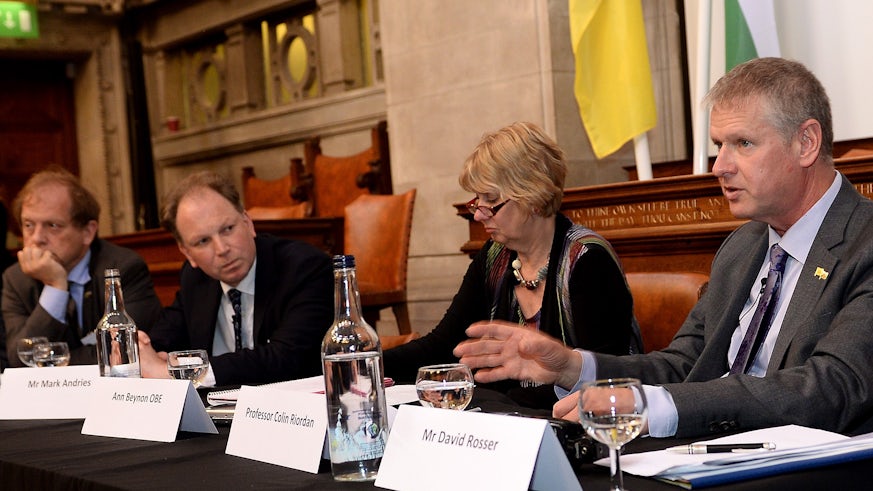Cardiff’s innovation debate with Belgium’s biggest university
10 July 2015

"Without curiosity-driven research there can be no innovation," says Cardiff University's Vice-Chancellor, as he defends the value of Arts and Humanities to society
The official signing of a major partnership agreement between Wales's top ranked university and Belgium's largest university was yesterday marked by a debate featuring politicians and higher education representatives.
The agreement between Cardiff University, a top-5 UK University for research excellence and impact, and KU Leuven, a world top-100 university, is geared towards boosting funding for research, creating new research collaborations and offering more opportunities for students and staff to study and teach abroad.
Following the signing, Cardiff's Vice-Chancellor Professor Colin Riordan and KU Leuven's Rector Rik Torfs both joined a panel of experts from Flanders and Wales in a Question Time-style debate.
Given the two nations' similar systems of devolved government and unique cultural and linguistic identities, the debate focused on the role of devolved nations' universities in growing the economy through innovation.
Sitting on the panel with Cardiff's Vice-Chancellor and his Belgian equivalent were David Rosser (Director of Innovation, Welsh Government), Professor Danny Pieters (Vice-Rector, KU Leuven) and Mark Andries (Government of Flanders representative). The debate was chaired by Ann Beynon OBE, director of BT Wales.
Among the most spirited topics of debate was the question of what role the Arts and Humanities should play in a university's innovation agenda, to which Professor Riordan, himself a scholar of German literature, responded:
"The essence of all universities is the creation and dissemination of knowledge. We should not be in a position where we are telling academics what they should be curious about or what they should research – without curiosity-driven research there can be no innovation. Arts and Humanities should not have to justify their research in terms of its value to the economy."
Rik Torfs, a former Senator for the Christian Democratic and Flemish party in the Belgian Federal Parliament, warned that universities should not become "valets to the system" and observed that society often has unrealistic expectations of higher education, conceding that universities "won't have the ultimate solutions to all economic problems."
Academics should do more to engage with the media, was the view of Professor Pieters, who thought that too many researchers remained "quiet" allowing less accomplished researchers to become media spokespeople in their place.
The day coincided with Flanders's National Day of Celebration, which commemorates the Battle of the Spurs (1302), where citizen militias of the Flemish cities and municipalities defeated an army of French knights on horseback to ultimately retain their independence.
The University hosted a celebratory event prior to the debate attended by Carwyn Jones, First Minister for Wales, and representatives from the Flemish Government, including the Secretary General for Foreign Affairs, Koen Verlaeckt.
KU Leuven was founded in 1425 and is the world's oldest surviving Catholic university and the largest university in Belgium. It is consistently ranked in the world's top 100 universities.
With some 6,800 academic staff and more than 55,000 students, it is a leading European research university offering a comprehensive programme of study in both Dutch and English.
In the Government's Research Excellence Framework 2014, Cardiff University was ranked 5th in the UK for the quality of its research and 2nd in the UK for impact.